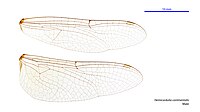Hemicordulia continentalis
Appearance
| Fat-bellied emerald | |
|---|---|
| Scientific classification | |
| Domain: | Eukaryota |
| Kingdom: | Animalia |
| Phylum: | Arthropoda |
| Class: | Insecta |
| Order: | Odonata |
| Infraorder: | Anisoptera |
| Family: | Corduliidae |
| Genus: | Hemicordulia |
| Species: | H. continentalis
|
| Binomial name | |
| Hemicordulia continentalis | |

| |
Hemicordulia continentalis is a species of dragonfly in the family Corduliidae,[3] known as the fat-bellied emerald.[4] It inhabits pools, lakes, ponds and swamps in coastal Queensland and northern New South Wales, Australia.[5]
Hemicordulia continentalis is a small to medium-sized, black and yellow dragonfly with long legs. The male abdomen is swollen giving the appearance of a club. In both males and females the inboard edge of the hindwing is rounded.[6]
Gallery
[edit]-
Female wings
-
Male wings
See also
[edit]References
[edit]Wikimedia Commons has media related to Hemicordulia continentalis.
- ^ Hawking, J. (2009). "Hemicordulia continentalis". IUCN Red List of Threatened Species. 2009: e.T163550A5614899. doi:10.2305/IUCN.UK.2009-2.RLTS.T163550A5614899.en. Retrieved 20 November 2021.
- ^ Martin, Rene (1907). "Cordulines". Collections Zoologiques du Baron Edm. de Selys Longchamps (in French). Vol. 17. Brussels: Hayez. pp. 1–94 [13] – via Biodiversity Heritage Library.
- ^ "Species Hemicordulia continentalis Martin, 1907". Australian Faunal Directory. Australian Biological Resources Study. 2012. Retrieved 4 February 2017.
- ^ Theischinger, Günther; Hawking, John (2006). The Complete Field Guide to Dragonflies of Australia. Collingwood, Victoria, Australia: CSIRO Publishing. p. 246. ISBN 978-0-64309-073-6.
- ^ Theischinger, Gunther; Endersby, Ian (2009). Identification Guide to the Australian Odonata. Department of Environment, Climate Change and Water NSW. p. 217. ISBN 978-1-74232-475-3.
- ^ Watson, J.A.L.; Theischinger, G.; Abbey, H.M. (1991). The Australian Dragonflies: A Guide to the Identification, Distributions and Habitats of Australian Odonata. Melbourne: CSIRO. ISBN 0643051368.



